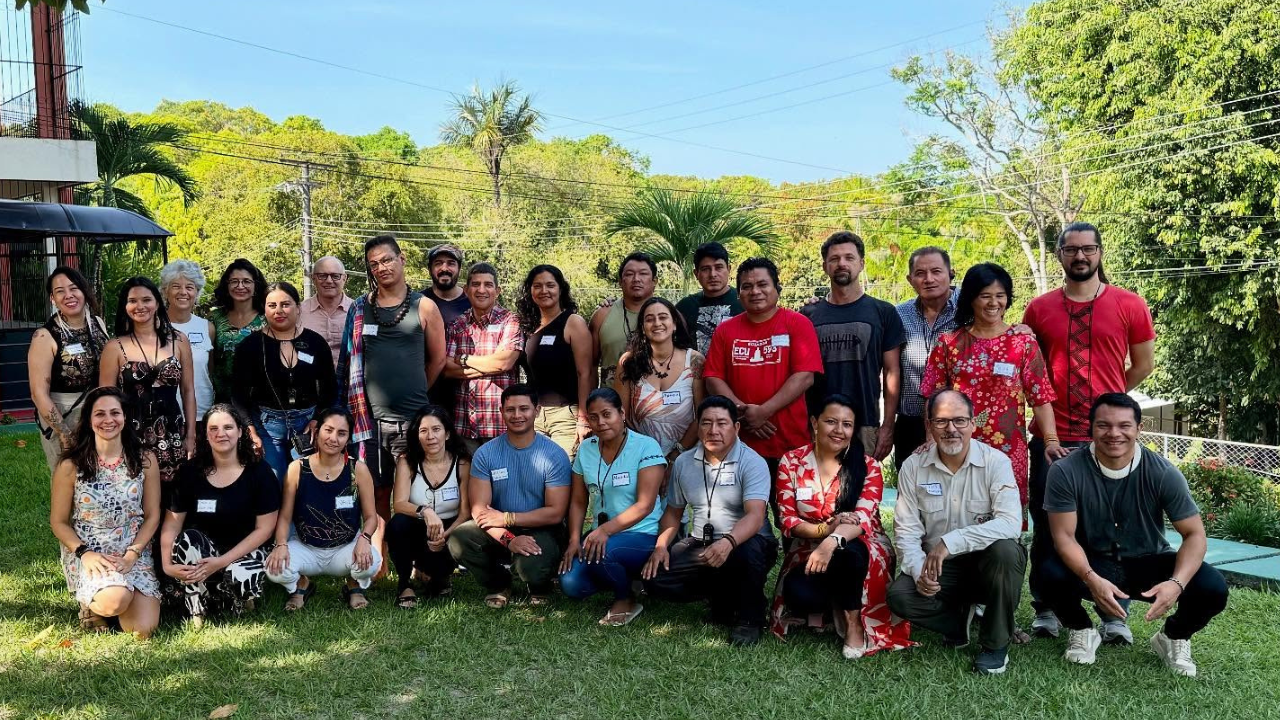The third workshop of the Power of Connections project will take place in Manaus, Amazonas, Brazil, from September 1 to 4, 2025. The event will gather Indigenous peoples, community leaders, researchers, and representatives from the government, NGOs, grassroots organizations, and the private sector to reflect on collaborative management strategies across the Amazon region. This co-management workshop aims to share lessons learned from innovative initiatives in the region, exchange practical tools and approaches that center Indigenous Peoples and Local Communities, and build community among co-management practitioners.
Over the last decades, community-based conservation and co-management have emerged as more inclusive and effective responses to the limitations of top-down conservation models. These approaches recognize Indigenous and traditional peoples as essential stewards of their territories and create mechanisms where responsibilities, benefits, and decision-making are shared among communities, governments, and other actors. The workshop in Manaus seeks to analyze these experiences in depth. Participants will discuss successful practices, evaluate the conditions that enabled them, and identify principles and tools to guide future conservation and sociobioeconomy initiatives in the Amazon and beyond.
“Collaborative management of biodiversity is central to current discussions on sociobioeconomy,” explained João Campos-Silva, co-founder of Instituto Juruá in Brazil and workshop theme co-lead. “This workshop is especially relevant because it elevates the needs and solutions that emerge from the ground. Listening to local protagonists is essential to guiding science and policy in ways that truly reflect the aspirations of Indigenous peoples and local communities.”
For Galo Zapata-Ríos, Scientific Director of WCS Ecuador and workshop theme co-lead, the gathering represents a unique moment for regional learning and solidarity. “This workshop responds to urgent challenges, including the historical exclusion of Indigenous Peoples and Local Communities from decision-making and the paucity of tools adapted to diverse cultural contexts. The exchange of experiences will allow us to identify common principles and useful strategies that can inspire new initiatives. In the long run, we hope to consolidate collaborative management models that are sustainable, equitable, and culturally meaningful.”
Dr. Karen Kainer, University of Florida faculty member and project Principal Investigator, highlighted the broader vision behind the initiative. “Indigenous and traditional rural communities are fundamental actors in conserving biodiversity across the Amazon basin. Increasingly recognized as legitimate stewards of the lands and waterways they inhabit, these communities have developed innovative ways to co-manage their territories with governments and other partners.”
For Ana Luiza Violato Espada, postdoctoral associate in the project, “collaborative management refers to a process wherein multiple actors jointly negotiate to define key management responsibilities, rights, and benefits over an area or set of natural resources. The workshop in Manaus will be particularly relevant as it creates space to discuss how actors from different Amazonian countries envision and implement collaborative management in their territories, both to conserve natural resources and to promote community well-being.”
The workshop in Manaus will not only showcase concrete cases of collaborative management initiatives, but also will create space for new alliances and cross-generational coalitions that drive protection of the peoples who safeguard the region. Indeed, to Maria DiGiano, Program Officer, Andes-Amazon Initiative, Gordon and Betty Moore Foundation, the workshop will be a chance to focus on people-centered efforts towards Amazon conservation: “As I join this workshop, I’m reminded that the Amazon’s greatest strength is its people. These gatherings create space to connect across borders, share ideas, and build solutions together that honor both biodiversity and community well-being.”
More information about the project: https://amazonconservationconnections.com.
This project is funded by the Gordon and Betty Moore Foundation through Grant GBMF13270.
About the Tropical Conservation and Development (TCD) Program
The mission of the Tropical Conservation and Development (TCD) Program is to connect theory and practice to promote biodiversity conservation, sustainable natural resource use, and human well-being in the tropics and beyond. TCD is a research and training program of the Center for Latin American Studies at the University of Florida, with 10 core faculty members and approximately 100 affiliated professors across the campus. The program has a long history of collaboration with partner organizations in the Amazon and of supporting networks of conservation professionals committed to sustainable development.
About the Gordon and Betty Moore Foundation
The Gordon and Betty Moore Foundation promotes scientific discovery, environmental conservation, and the special character of the San Francisco Bay Area. Since 2001, its Andes-Amazon Initiative has helped conserve more than 400 million hectares in the Amazon. By 2031, the initiative aims to ensure that 70 percent of the Amazon biome (forest cover) and the freshwater ecosystems that sustain it are under effective management and conservation.
Visit Moore.org and follow @MooreFound to learn more

